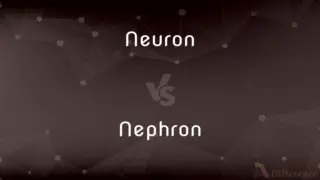Education vs. Intelligence — What's the Difference?
Edited by Tayyaba Rehman — By Fiza Rafique — Updated on April 1, 2024
Education involves the systematic acquisition of knowledge and skills through study or instruction, while intelligence is the capacity for learning, reasoning, understanding, and similar forms of mental activity.

Difference Between Education and Intelligence
Table of Contents
ADVERTISEMENT
Key Differences
Education is a structured process of acquiring knowledge and skills through teaching and learning, often facilitated by institutions such as schools and universities. Intelligence, on the other hand, refers to the innate ability to learn, understand, and apply knowledge, solve problems, and adapt to new situations.
While education can be measured by academic achievements and degrees, intelligence is often assessed through cognitive tests that evaluate various mental abilities.
Education aims to impart a specific body of knowledge and skills to enhance an individual’s capabilities and social function, whereas intelligence encompasses a broader range of cognitive abilities, including logical reasoning, problem-solving, and creativity.
Education is influenced by external factors, including the quality of schooling, access to learning resources, and socio-economic status. Intelligence, while subject to environmental influences, is also considered to have a genetic component, indicating a blend of nature and nurture in its development.
The relationship between education and intelligence is synergistic; education can foster the development of intelligence, providing the tools and opportunities for individuals to apply and expand their innate cognitive abilities.
ADVERTISEMENT
Comparison Chart
Definition
The process of receiving or giving systematic instruction
The ability to acquire and apply knowledge and skills
Measurement
Degrees, diplomas, certificates
IQ tests, cognitive assessments
Purpose
To impart knowledge and skills
To solve problems and adapt to new situations
Influence
Structured curriculum, societal expectations
Genetic factors, environmental influences
Relationship
Enhances and utilizes intelligence
Can be developed and nurtured through education
Compare with Definitions
Education
Influenced by external factors.
Access to quality education varies significantly with socio-economic status.
Intelligence
Not solely academic.
Emotional intelligence is crucial for understanding and managing emotions in oneself and others.
Education
Measured by academic achievements.
He received his education at a prestigious university, earning several degrees.
Intelligence
Includes reasoning and understanding.
Intelligence involves the ability to reason, plan, and solve problems creatively.
Education
Structured and formalized.
Formal education typically progresses from primary to secondary and then to tertiary levels.
Intelligence
Innate mental ability.
Her intelligence allowed her to solve complex problems with ease.
Education
Systematic learning.
She pursued higher education to deepen her knowledge in biology.
Intelligence
Assessed through cognitive tests.
His intelligence quotient (IQ) was measured to be above average.
Education
Aims to impart knowledge.
The curriculum is designed to educate students in both theory and practical applications.
Intelligence
Genetic and environmental influences.
Twins separated at birth showed similar intelligence levels, highlighting genetic factors.
Education
Education is the process of facilitating learning, or the acquisition of knowledge, skills, values, morals, beliefs, and habits. Educational methods include teaching, training, storytelling, discussion and directed research.
Intelligence
Intelligence has been defined in many ways: the capacity for logic, understanding, self-awareness, learning, emotional knowledge, reasoning, planning, creativity, critical thinking, and problem-solving. More generally, it can be described as the ability to perceive or infer information, and to retain it as knowledge to be applied towards adaptive behaviors within an environment or context.
Education
The act or process of educating or being educated.
Intelligence
The ability to acquire, understand, and use knowledge
A person of extraordinary intelligence.
Education
The knowledge or skill obtained or developed by a learning process.
Intelligence
Information, especially secret information gathered about an actual or potential enemy or adversary.
Education
A program of instruction of a specified kind or level
Driver education.
A college education.
Intelligence
The gathering of such information
"Corporate intelligence relies on a slew of tools, some sophisticated, many quite basic" (Neil King and Jess Bravin).
Education
The field of study that is concerned with the pedagogy of teaching and learning.
Intelligence
An agency or organization whose purpose is to gather such information
An officer from military intelligence.
Education
An instructive or enlightening experience
Her work in an animal shelter was a real education.
Intelligence
An intelligent, incorporeal being, especially an angel.
Education
(uncountable) The process of imparting knowledge, skill and judgment.
Good education is essential for a well-run society.
Intelligence
Of mind, especially to understand principles, truths, facts or meanings, acquire knowledge, and apply it to practice; the ability to comprehend and learn.
Education
(countable) Facts, skills and ideas that have been learned, especially through formal instruction.
He has had a classical education.
The educations our children receive depend on their economic status.
Intelligence
The quality of making use or having made use of such capacities: depth of understanding, mental quickness.
Education
The act or process of educating; the result of educating, as determined by the knowledge skill, or discipline of character, acquired; also, the act or process of training by a prescribed or customary course of study or discipline; as, an education for the bar or the pulpit; he has finished his education.
To prepare us for complete living is the function which education has to discharge.
Intelligence
(countable) An entity that has such capacities.
Education
The activities of educating or instructing or teaching; activities that impart knowledge or skill;
He received no formal education
Our instruction was carefully programmed
Good teaching is seldom rewarded
Intelligence
, often secret, about an enemy or about hostile activities.
Education
Knowledge acquired by learning and instruction;
It was clear that he had a very broad education
Intelligence
(countable) A political or military department, agency or unit designed to gather information, usually secret, about the enemy or about hostile activities.
Education
The gradual process of acquiring knowledge;
Education is a preparation for life
A girl's education was less important than a boy's
Intelligence
(dated) acquaintance; intercourse; familiarity.
Education
The profession of teaching (especially at a school or college or university)
Intelligence
The act or state of knowing; the exercise of the understanding.
Education
The result of good upbringing (especially knowledge of correct social behavior);
A woman of breeding and refinement
Intelligence
The capacity to know or understand; readiness of comprehension; the intellect, as a gift or an endowment.
And dimmed with darkness their intelligence.
Education
The United States federal department that administers all federal programs dealing with education (including federal aid to educational institutions and students); created 1979
Intelligence
Information communicated; news; notice; advice.
Intelligence is given where you are hid.
Intelligence
Acquaintance; intercourse; familiarity.
He lived rather in a fair intelligence than any friendship with the favorites.
Intelligence
Knowledge imparted or acquired, whether by study, research, or experience; general information.
I write as he that none intelligenceOf meters hath, ne flowers of sentence.
Intelligence
An intelligent being or spirit; - generally applied to pure spirits; as, a created intelligence.
The great Intelligences fairThat range above our mortal state,In circle round the blessed gate,Received and gave him welcome there.
Intelligence
The division within a military organization that gathers and evaluates information about an enemy.
Intelligence
The ability to comprehend; to understand and profit from experience
Intelligence
A unit responsible for gathering and interpreting information about an enemy
Intelligence
Secret information about an enemy (or potential enemy);
We sent out planes to gather intelligence on their radar coverage
Intelligence
New information about specific and timely events;
They awaited news of the outcome
Intelligence
The operation of gathering information about an enemy
Common Curiosities
How is education measured?
Education is typically measured through formal qualifications like degrees and diplomas.
Can education improve intelligence?
Education can enhance cognitive abilities, providing opportunities to apply and develop innate intelligence.
What is the purpose of education?
The purpose of education is to impart specific knowledge and skills, preparing individuals for various aspects of life.
How is intelligence assessed?
Intelligence is often assessed through cognitive tests and IQ scores.
What are examples of intelligence outside of academia?
Creative problem-solving, emotional intelligence, and adaptability are examples of intelligence outside traditional academic metrics.
Is intelligence fixed at birth?
Intelligence can develop and change over time, influenced by both genetic predispositions and environmental factors.
What is education?
Education is the systematic acquisition of knowledge and skills through study and instruction.
What is intelligence?
Intelligence is the innate capacity for learning, reasoning, understanding, and other forms of mental activity.
Can intelligence be increased?
Certain aspects of intelligence, like problem-solving skills and knowledge, can be developed through education and practice.
Can someone be intelligent without formal education?
Yes, individuals can exhibit high intelligence and achieve significant understanding or innovation without formal education.
How do education and intelligence interact?
Education and intelligence interact synergistically, with education nurturing and applying innate intelligence.
Is intelligence solely determined by genetics?
While genetics play a significant role, environmental factors also significantly influence intelligence.
What role does environment play in education?
The environment, including access to resources and quality of teaching, plays a crucial role in the effectiveness of education.
Why is emotional intelligence important?
Emotional intelligence is vital for understanding, managing, and using emotions effectively in interpersonal relationships.
Is a high IQ equivalent to being highly educated?
A high IQ indicates strong cognitive abilities, but it does not necessarily equate to being highly educated in formal academic terms.
Share Your Discovery

Previous Comparison
Share vs. Stock
Next Comparison
Neuron vs. NephronAuthor Spotlight
Written by
Fiza RafiqueFiza Rafique is a skilled content writer at AskDifference.com, where she meticulously refines and enhances written pieces. Drawing from her vast editorial expertise, Fiza ensures clarity, accuracy, and precision in every article. Passionate about language, she continually seeks to elevate the quality of content for readers worldwide.
Edited by
Tayyaba RehmanTayyaba Rehman is a distinguished writer, currently serving as a primary contributor to askdifference.com. As a researcher in semantics and etymology, Tayyaba's passion for the complexity of languages and their distinctions has found a perfect home on the platform. Tayyaba delves into the intricacies of language, distinguishing between commonly confused words and phrases, thereby providing clarity for readers worldwide.











































